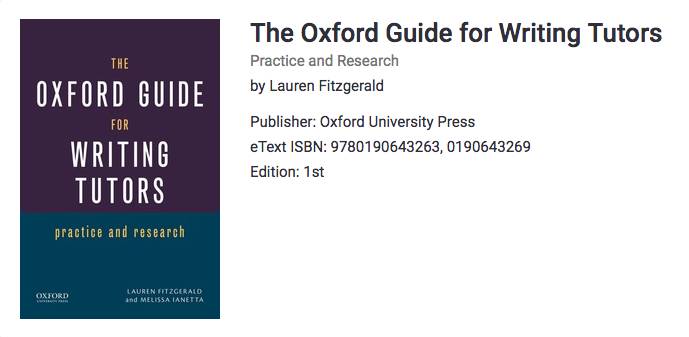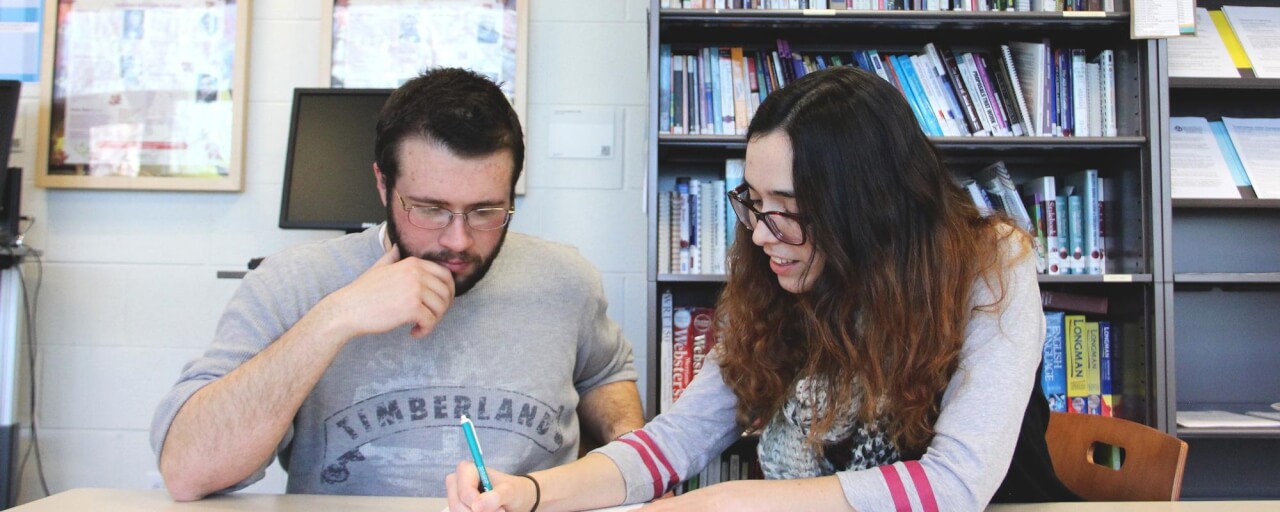Hiring & Training Consultants
Hiring Process
In order to work as a consultant, one must successfully complete a rigorous application and interview process. The Fred Meijer Center for Writing looks for a variety of qualities in potential hires.
Mission, Vision, Values
The Fred Meijer Center for Writing & Michigan Authors provides all university writers with the resources and services they need to meet their writing goals. The center offers a wide variety of programming to students, faculty and staff--such as in-class writing support (WRT 120/130/150 and SWS courses where consultants work individually or with groups of students), faculty/staff writing retreats (time and space in which to write, facilitated by a writing coach), workshops (on a variety of topics), and writing groups (opportunities for writers to get and give feedback on drafts in small groups). However, the hallmark of the center's work is the one-to-one consultation facilitated by a trained peer-writing consultant. Sessions can act as a tutorial or pedagogical moment, but each consultation functions as collaborative, intellectual exchange.
Undergraduate and graduate students are trained via a two-day orientation, a one-credit academic course, and ongoing trainings throughout the academic year. During training, they learn to ask the writer questions in an effort to understand the writer's goals for a piece of writing, the parameters of the assignment, and the writer's questions or concerns about the draft. Additionally, consultants are trained to read rhetorically, meaning that consultants "say back" what the piece of writing is about and how it is structured, in order to provide a way for the student to think metacognitively about the writing and reflectively about his or her writing process. In cases where a student does not yet have a draft, the consultant can facilitate pre-writing activities to help the writer generate ideas for the assignment. Later in the writing process, consultants employ activities to help the writer revise and edit the text. Every session ends with the writer devising a plan for revision. The goal of these writing consultations is to help writers help themselves--not just with that single piece of writing, but also to become better writers overall.
We view Grand Valley as a community of writers, all with their own writing processes, purposes, and goals. The center should enable students, faculty, and staff to achieve their writing goals and become full participants in our campus community as well as in larger academic, professional, and global contexts.
The Fred Meijer Center for Writing and Michigan Authors is founded on the principle that writing is a social act and that a writer’s peers – whether undergraduate, graduate, or faculty/staff – can, with proper training and support, provide a writer with valuable writing assistance. Therefore, we value:
1. Process
Just as Grand Valley strives for excellence, the The Fred Meijer Center for Writing and Michigan Authors values time and space for writers to practice the writing process; we believe this perspective is essential to a writer’s confidence and personal success in writing. We train our writing consultants, therefore, with the skills and knowledge necessary to approach writing from a process-oriented mindset so as to pass that perspective on to other writers and fellow thinkers. Through this value, the center hopes to be an instrumental resource for our clients to become more intentional writers.
2. Dignity
The center greatly values the dignity of all who enter our space, use our services, and/or work for our center. We aim to not only respect the dignity of others, but also promote and nurture the dignity that may yet be acknowledged in an individual. By valuing dignity, we hope to maintain the integrity of writers, their peers, and their sources of expert perspective (i.e. academic citations, formatting, and audience expectations). Our writing consultants, therefore, are trained to embody the liberal education components of dialogue and collaboration, which require empathy, constructive positive feedback, and respect toward the writer and their identified needs and goals. By aligning ourselves with this desired framework, it is essential that the center stay grounded in this value of dignity.
3. Curiosity
The Fred Meijer Center for Writing and Michigan Authors aims to create a safe environment for the free exchange of ideas. We ground much of our consulting work not only in theory, research, and the field’s best practices, but also in curiosity, inquiry, and critical thinking. We ask that our consultants learn respectful strategies for supporting writers in their quest for new knowledge. We take on the responsibility to support writers in their acquisition of descriptive, declarative, and procedural knowledge; therefore, we promote active and engaged curiosity at all levels of the writing process for consultants and authors.
4. Inclusiveness
The center aligns itself with Grand Valley in valuing all identities, perspectives, and backgrounds and aims to create a safe and inclusive environment for everyone who enters. We employ students from multiple disciplines, language backgrounds, educational experiences, and personal cultures – not only for the purposes of supporting the interdisciplinary nature of writing, but also to promote and grow an inclusive and diverse community of writers, thinkers, and members.
5. Community
In the same way that we aim for inclusiveness, the center actively promotes community in all aspects of our work – community in an individualized consultation, community at our locations, community online, and collaborative communities on campus. At the university level, the center functions as an intellectual contact zone, where students can discuss, challenge, and respond to feedback from trained peer consultants. By creating a space where all writers are encouraged to engage with their peers, the center champions creating communities on local and global scales. One of the essential features to building community is empathy, which includes an attention to listening, judgment free consulting styles, adaptable strategies and practices, and awareness and acknowledgement of one’s personal and subjective biases. Through empathy, the Fred Meijer Center for Writing and Michigan Authors aims to build a healthy community full of independent, active thinkers with the drive to promote the love of writing beyond our physical spaces.
6. Empowerment
The Fred Meijer Center for Writing and Michigan Authors considers power to be an instrumental feature in one’s belief of their own capacity to approach, complete, and succeed in any writing project; therefore, the center values our role in the empowerment of emerging, practiced, or expert writers. Through our pedagogically sound consulting techniques, consultants provide writers with the time and space to celebrate success, identify concerns, develop helpful strategies, and grow a personalized voice and style so as to continue the writing process beyond the walls of the Writing Center. We make it our mission to be a supportive place and service for writers, who want or need to acknowledge and grow their own agency over any writing project or future writing goal.
7. Adaptability
Through our innovative collaborative efforts and our critical awareness of our clients’ needs, The Fred Meijer Center for Writing and Michigan Authors hopes to pin adaptability at the forefront of our mission and of our daily work. Not only do we orient every individual consultation toward each writer’s own specific needs and goals, we focus on adapting our training, practices, and services to the constant evolving qualities and identities of our clients. Additionally, we aim to adapt to changing technology needs, student expectations, and evolving university goals. The center offers multiple avenues of writing support to serve the campus community, which include face-to- face consultations, online consultations, group consultations, classroom support, electronic resources, and multiple locations at our various GVSU campuses.
Students have to provide information on the following academic areas:
- Class standing
- GPA
- Relevant course work
- Major and Minor/Emphasis
They also need to submit the following:
- Two writing samples, one of which must include examples of citation formatting. We want consultants who work with the Center to be successful writers themselves, but also able to work well with their peers and to respond appropriately and helpfully to student writing in many situations.
- Professor recommendation
Consultants are chosen through an extensive application process, where they answer a series of questions related to past experiences, personality, and hypothetical scenarios common to the Writing Center work.
Students wishing to become consultants must fill out long written applications and perform well during an hour-long interview.
Training Process
After hire, consultants receive extensive training.
- All consultants participate in an orientation held before fall classes begin.
- New consultants complete a one-credit academic course called WRT 306: Seminar for New Consultants. In this course, consultants continue to hone their tutoring skills & also read research and theory related to composing processes, responding to writing, and writing center pedagogy.
- New consultants meet in small mentoring groups weekly.
- All consultants attend a number of Professional Development workshops, seminars, or presentations throughout the academic year. Each event is focused on a specific tutoring situation or topic and are a way of helping consultants learn new and more effective ways of doing their work.
- New consultants are observed during their first semester of work so the Director and Lead Consultants can mentor them more effectively.
The WRT 306 Textbook

What do they learn to do?
Through this training process, we expect our consultants to be able to complete the staples of our service:
1. One-on One Support: writing consultants are trained to facilitate conversation about your writing at any stage of the process, whether in person or online
2. Classroom Work: writing consultants are trained to be able to support writers in a classroom setting by being prepared to A) work one-on-one or B) facilitate small groups.
3. Group Facilitation: writing consultants are trained to facilitate small writing groups, which are made up of individuals writing group papers together, conducting peer review, or are working through brainstorming topics together
Additional Professional Development
Every consultant must learn the core of what we do at the Writing Center. Additionally, consultants are encouraged to exercise their personal ambition and achieve higher-impact learning through other professional experiences.
Consultants can:
- Become a Lead consultant -- someone who is given additional responsibility to meet with Writing Center administration on a regular basis, who often oversees a personal project related to writing center work, who manages and facilitates the two-day orientation for new consultants, who facilitates the small new-consultant mentor group meetings, and who manages and models best practices at all of our locations.
- Attend and/or Present at a Conference -- the Fred Meijer Center for Writing and Michigan Authors values the conference experience. We actively encourage our staff to attend at least one conference per year (we fund their attendance to the MiWCA conference), and we try to assist our consultants' efforts in presenting as often as they can. We often encourage participation at the following conferences: Michigan Writing Center Association (MiWCA), East Central Writing Center Association (ECWCA), and the National Conference on Peer Tutoring in Writing (NCPTW).
- Create Writing Center Resources -- each year, our staff is a new diverse ecosystem of specialties, strategies, disciplines, and personalities. We encourage our staff to immortalize these qualities in teaching or reference resources to be published in the Writing Center.
- Complete Individual Research Project -- though not all consultants are required to do so, when taking WRT 306, many consultants are encouraged to investigate one area of Writing Center research of interest and produce a personal project on the matter.

